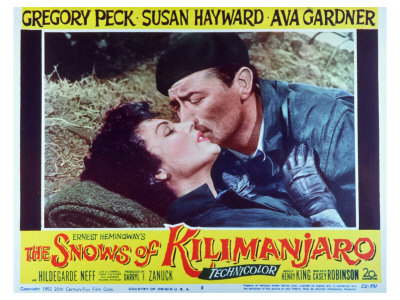My lone venture into author Ernest Hemingway's repertoire is A Farewell to Arms which I had to read for an English class in high school. I don't want to under/over sell my feelings on the book, but I hated it with a passion. It wasn't so much Hemingway's style -- simplistic and understated -- because I appreciated that after reading unnecessarily wordy classics in every class I took. It was the actual story, a lost love story so sugary, so schmaltzy that I wanted both of the main characters to die horrifically. I got through the book thankfully, but it was a trial.
Since then, I've been wary of anything Hemingway-related. I don't avoid him or steer clear of him intentionally, but something he is associated with truly has to catch my eye. Released in 1952, The Snows of Kilimanjaro caught my attention mostly because of the cast while the story sounded suspiciously like A Farewell to Arms. I trudged on though, intent on giving this movie a chance. It was a mixed bag that made me realize Hemingway continued to go back to the same well over and over again. His main character is a variation on himself, a romantic, an idealist and a cynic at the same time who wants to explore and see everything the world has to offer. It sounds interesting at least.
While on safari with girlfriend/lover/fiance, Helen (Susan Hayward), writer/journalist Harry Street (Gregory Peck) scratches his knee on a thorn, the wound quickly becoming infected. Almost certainly staring death in the face if medical attention doesn't arrive soon, Harry lies on his cot in the isolated African savanna waiting for his end. Through the heat and the hallucinations, he looks back on the lost loves of his life, including Cynthia (Ava Gardner) who he meets and falls in love with in Paris following WWI, Countess Liz (Hildegard Knef), a well-to-do member of the upper class he meets on the French Riviera, and then lastly, Helen. But seeing all the mistakes he made in life, Harry tortures himself in what could be his final moments.
During his career, Hemingway went wherever the story was and ended up taking part in the World War I, Spanish Civil War, World War II, African safaris, while also visiting everywhere from Cuba to Paris and all cities in between. He was a storyteller, looking for answers of some sort, why men/women did what they did. That was the biggest appeal of this story. Peck -- apparently channeling a Hemingway-like character -- is always on the move, following the action in his globe-trotting ways. It does become tiresome because we see the toll it takes on Harry's life and those he loves before he ever puts two and two together. Still, a man who will drop anything to follow what he loves to do is an appealing main character.
In my previous Peck reviews, I know I've discussed the mental picture many moviegoers have of the famous Hollywood actor. He's Atticus Finch, the stoic, even wooden main character without much in the way of fire. He did play many roles like that, but through the first 10 years of his career, it was different. He played characters like this. Somewhat eccentric with a fire for life, nothing will stop him. These are the type of roles I typically bring up when someone notes they are not Gregory Peck fans. Even when the movie overall is a disappointment, he rarely is.
Channeling Hemingway though, it's not just the character. It's the lifestyle as well. Director Henry King works off the source novel, but not having read it I can only guess what he was forced to do. Instead of focusing more on Harry and his relationships with Cynthia, Helen and Liz, 'Snow' serves more as a travel guide for the places they visit. Yes, I realize part of the story is Harry's adventures as he explores the world. But long, unedited shots of animals on the African savanna, bullfights in Madrid, and a bizarre ending with a curious hyena do absolutely nothing for the story. Go watch a PBS episode of Nature or The Travel Channel for an idea of what you will get here.
As for the story told in flashback mode, the one with Gardner is given the most attention and for good reason. Frequent on-screen partners, Peck and Gardner had an incredibly natural chemistry that always makes the movie worthwhile to a point. The other two flashbacks are not as successful. Countess Liz is shrill and pretentious while Hayward's Helen feels tacked on to the point we're never given much information about her other than that she falls madly in love with Peck. Hit or miss overall, but that's the movie as a whole. Good and bad with the negative barely outweighing the positive. The movie is available to watch in its entirety on Youtube if you're curious.
The Snows of Kilimanjaro <---trailer (1952): **/****


No comments:
Post a Comment